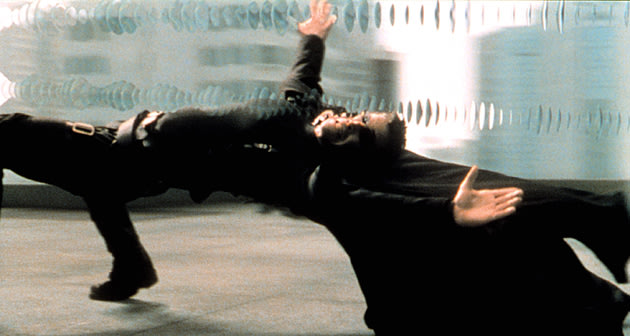This is a post from the series, "The Highest Human Science". Click here for a complete list of all posts in the series.
One of the most popular action films of all time, "The Matrix" (1999) has been critically acclaimed for its original and captivating story. For those who haven't seen the film, it is about a world in which the "real world" you experience is not actually real. Instead, the entire human populations is plugged into one massive super computer via a prehistoric USB connection in the base of the neck, whilst being suspended in a vat of jelly. This is the general premise of the film and, yes, it makes for some exciting science fiction. If you haven't seen it, I can't recommend it enough because it truly revolutionized the way films are made (the sequels, I could do without).
Though I said this was an original story, it's true that many philosophers, most notable Renee Descartes, suggested that our senses may not be entirely trustworthy. His philosophy's foundation was to doubt everything and rebuild our rational structure from the certain truths while leaving out the falsehoods, almost like overturning an apple cart of ripe and rotten apples, so as to pick up the good apples and leave the rotten ones on the ground and out of the cart. It was in this process that he wrote the now-famous (or infamous) phrase, Cogito ego sum ("I think, therefore I am") in which he claims to have proven his own existence after doubting it momentarily. (Descartes was pretty hardcore about this doubting thing) But what was truly revolutionary about the Matrix was that with the dawn of the digital age, it put forth a world in which there might be a very good reason to doubt what we see, taste, smell, touch, and hear.
 |
| Descartes upset the apple cart and this donkey |
Early "pre-philosophical" thought was frequently confused as being rooted in religious beliefs and practices. The human wisdom studied in philosophy was mingled with sacred traditions and practices such that it was no longer rooted in human reason. Rather, it took its foundations in religious traditions of ancient cultures, and not in the exercise of human reason, independent of religion. Essentially, human reason had little or no part in informing the civilization's philosophy.
One such mistake is the concept of dualism, the idea that two eternal and uncreated principles of Good and Evil fight in a never-ending cosmic struggle. It is typically commonly used as an answer to the problem of evil, and was the core belief of the Persian culture, specifically in the beliefs of Zoroastrianism and Manichaeism. The hope was to explain why good and evil are able to coexist in the world; however, the erroneous implication of dualism is that evil is natural to the world, (as opposed to the Christian understanding in which evil is a privation of good). This leads to the conclusion that there are created beings that are evil by their very nature.
One such mistake is the concept of dualism, the idea that two eternal and uncreated principles of Good and Evil fight in a never-ending cosmic struggle. It is typically commonly used as an answer to the problem of evil, and was the core belief of the Persian culture, specifically in the beliefs of Zoroastrianism and Manichaeism. The hope was to explain why good and evil are able to coexist in the world; however, the erroneous implication of dualism is that evil is natural to the world, (as opposed to the Christian understanding in which evil is a privation of good). This leads to the conclusion that there are created beings that are evil by their very nature.
A musical summary of pantheism as taught/sung in Disney's Pocahontas
This short account of pre-philosophical errors is by no means exhaustive. We will examine many other errors in thought in future posts, but this will serve for now as a high-level overview of a few of the oldest intellectual errors. The main purpose of our dive into the weirdness of what the human mind can conceive was to prove that though these ideas may be worthy of science fiction, they're not worthy of much else...
Except for this...
*Adapted from Jacques Maritain's book, "An Introduction to Philosophy" (trans. by E.I. Watkin)


No comments:
Post a Comment